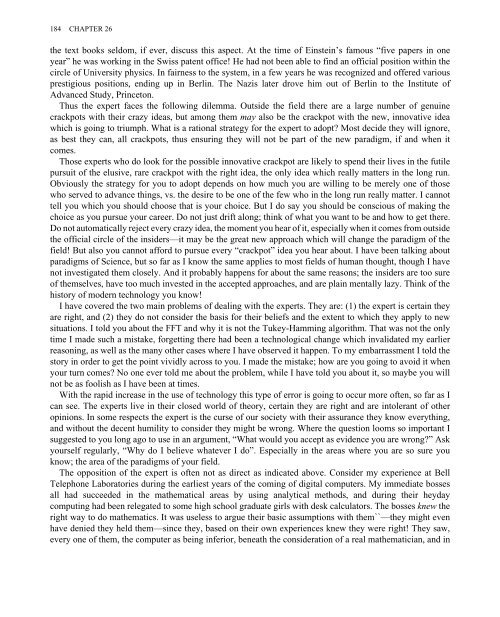hamming
hamming
hamming
You also want an ePaper? Increase the reach of your titles
YUMPU automatically turns print PDFs into web optimized ePapers that Google loves.
184 CHAPTER 26the text books seldom, if ever, discuss this aspect. At the time of Einstein’s famous “five papers in oneyear” he was working in the Swiss patent office! He had not been able to find an official position within thecircle of University physics. In fairness to the system, in a few years he was recognized and offered variousprestigious positions, ending up in Berlin. The Nazis later drove him out of Berlin to the Institute ofAdvanced Study, Princeton.Thus the expert faces the following dilemma. Outside the field there are a large number of genuinecrackpots with their crazy ideas, but among them may also be the crackpot with the new, innovative ideawhich is going to triumph. What is a rational strategy for the expert to adopt? Most decide they will ignore,as best they can, all crackpots, thus ensuring they will not be part of the new paradigm, if and when itcomes.Those experts who do look for the possible innovative crackpot are likely to spend their lives in the futilepursuit of the elusive, rare crackpot with the right idea, the only idea which really matters in the long run.Obviously the strategy for you to adopt depends on how much you are willing to be merely one of thosewho served to advance things, vs. the desire to be one of the few who in the long run really matter. I cannottell you which you should choose that is your choice. But I do say you should be conscious of making thechoice as you pursue your career. Do not just drift along; think of what you want to be and how to get there.Do not automatically reject every crazy idea, the moment you hear of it, especially when it comes from outsidethe official circle of the insiders—it may be the great new approach which will change the paradigm of thefield! But also you cannot afford to pursue every “crackpot” idea you hear about. I have been talking aboutparadigms of Science, but so far as I know the same applies to most fields of human thought, though I havenot investigated them closely. And it probably happens for about the same reasons; the insiders are too sureof themselves, have too much invested in the accepted approaches, and are plain mentally lazy. Think of thehistory of modern technology you know!I have covered the two main problems of dealing with the experts. They are: (1) the expert is certain theyare right, and (2) they do not consider the basis for their beliefs and the extent to which they apply to newsituations. I told you about the FFT and why it is not the Tukey-Hamming algorithm. That was not the onlytime I made such a mistake, forgetting there had been a technological change which invalidated my earlierreasoning, as well as the many other cases where I have observed it happen. To my embarrassment I told thestory in order to get the point vividly across to you. I made the mistake; how are you going to avoid it whenyour turn comes? No one ever told me about the problem, while I have told you about it, so maybe you willnot be as foolish as I have been at times.With the rapid increase in the use of technology this type of error is going to occur more often, so far as Ican see. The experts live in their closed world of theory, certain they are right and are intolerant of otheropinions. In some respects the expert is the curse of our society with their assurance they know everything,and without the decent humility to consider they might be wrong. Where the question looms so important Isuggested to you long ago to use in an argument, “What would you accept as evidence you are wrong?” Askyourself regularly, “Why do I believe whatever I do”. Especially in the areas where you are so sure youknow; the area of the paradigms of your field.The opposition of the expert is often not as direct as indicated above. Consider my experience at BellTelephone Laboratories during the earliest years of the coming of digital computers. My immediate bossesall had succeeded in the mathematical areas by using analytical methods, and during their heydaycomputing had been relegated to some high school graduate girls with desk calculators. The bosses knew theright way to do mathematics. It was useless to argue their basic assumptions with them``—they might evenhave denied they held them—since they, based on their own experiences knew they were right! They saw,every one of them, the computer as being inferior, beneath the consideration of a real mathematician, and in


